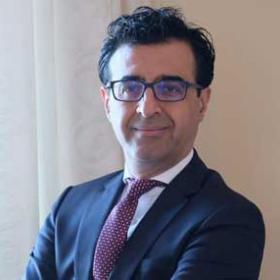
Hassan Discusses Protests in Iraq on Deutsche Welle
On October 10, Kawa Hassan, vice president of EWI’s Middle East and North Africa program, appeared on a joint Deutsche Welle and Sawt Loubnan radio program to discuss the driving factors behind recent demonstrations in Baghdad and Iraq’s southern provinces.
Click here to watch the interview on Deutsche Welle (in Arabic).
Read an English summary of Hassan’s remarks below:
These demonstrations, and the violent response from security forces and paramilitary groups, are different from demonstrations in 2015 and 2018. They are led by unemployed, underemployed, angry and desperate youth who fall outside traditional opposition parties and social movements. One could view this as an uprising of the post-2003 generation—those born before or after the fall of Saddam Hussein who do not have memories of the previous regime—against the post-2003 ruling elite. It might also be seen as an uprising of the Shiite youth—since the majority of demonstrators are Shiites—against the ruling Shiite parties. Nevertheless, the crackdown was very violent and shocked Iraqis.
The protest movement reflects the emergence of a new social awareness among youth that surprised not only the government, but more importantly, the older generation of activists. Iraqi journalist Dlovan Barwari best summarized the nature of this new movement, quoting a fellow journalist and activist who had been following the young protesters:
This is a young generation that acts very quickly. They are fast, they think differently—it is difficult for us to understand them. They act first and then think, contrary to us [the older generation]—we plan first, then theorize, only to fail in the implementation phase.
Demonstrators took to the streets to voice their opposition to rampant corruption among the ruling elites, as well as what is known as muhasasa ta'ifia—the building block of the political system that turned ministries and other state institutions into party fiefdoms. They are fed up with politicians’ broken promises of reform. They believe the current regime is irredeemable, despite announced reform measures from the prime minister, speaker of parliament and president.
Certain segments of the government, as well as paramilitary groups, interpret this social movement as an existential threat to their power and privileges. As a result, security forces and paramilitary groups used brute, excessive force against demonstrators. If the government doesn't demonstrate true commitment and the political will to implement real reforms—and continues to use brutal force against civilian protesters—there is a risk the social movement might radicalize, the chaos and violence might lead to the emergence of a "Syria Scenario," with devastating consequences for Iraq and beyond.
What should the government do to meet the demands of the protest movement?
First and foremost, the government should bring to justice security personnel and paramilitary groups that fired on civilian protesters and committed human rights violations. Second, the government and ruling class should show Iraqis that they possess the political will to implement real reforms and combat corruption at the top. Third, the electoral system should be reformed in a way that gives space and opportunities to new parties that represent youth interests to participate in genuinely free and fair elections, and gradually diminish the patronage and nepotism of established parties. Fourth, though the prime minister has activated the high council to combat corruption—which announced evidence of corruption among high-level politicians and ministers—so far, no high-level official has been charged and brought to justice.
If the government is serious about combating corruption, this is its chance—to prosecute corrupt officials and politicians based on rule of law, not on politicization of the topic of corruption. Without the political will to implement long overdue, real reforms and combat corruption of the ruling oligarchy, the short term future of Iraq will be bleak.

